- 030 244 2330
- info@preconceptacademy.com
Get access to free informative contents and tips on English
12 English Pronunciation Exercises to Improve Your Accent
- December 1, 2022
- Posted by: Joeyboadi
- Category: ESL

If you’re learning English pronunciation and find yourself struggling to get it right, there’s no need to worry – the pronunciation rules of this language can seem overwhelming at times, but if you put your mind to it and practise enough, you’ll eventually be able to say almost anything in English with confidence. In order to make sure that your accent doesn’t hold you back from expressing yourself correctly, make sure you try out these 12 English pronunciation exercises to help you improve your accent.
1) Minimal pairs

If you’re looking to improve your English pronunciation, one of the best ways is to practice minimal pairs. Minimal pairs are words that differ by a single sound, such as bat and pat. By practicing minimal pairs, you can become more aware of the different sounds in English pronunciation.
One way to practice minimal pairs is to create lists of words that differ in a single sound and read them aloud. Try writing out two columns on a piece of paper – one for bat and one for pat. Then, find other words that have the same sounds and write them in the appropriate column. You can also find printable worksheets with minimal pairs online or create your own.
Once you have your list, start reading aloud. Focus on the sound difference between the words and practice saying them quickly and clearly. As you get better at distinguishing the different sounds, you’ll find it easier to understand spoken English and develop better English pronunciation.
By regularly practicing minimal pairs, you can quickly improve your English pronunciation skills. With enough practice, you’ll soon be able to confidently speak and understand English like a native!
2) Connected speech
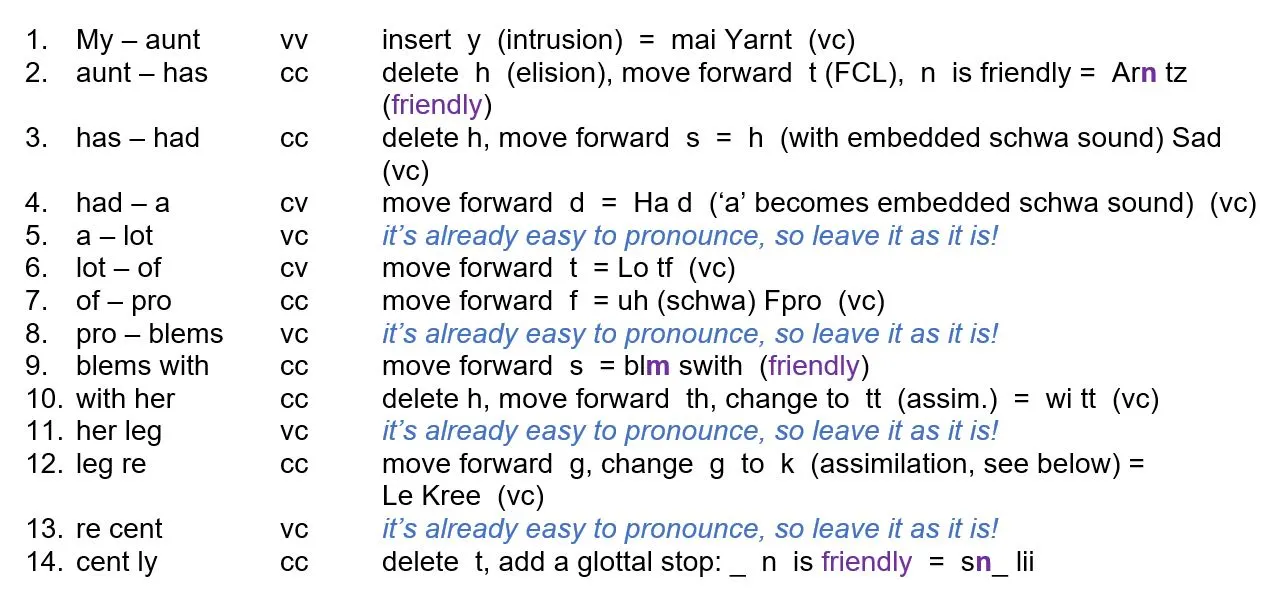
If you want to speak English like a native speaker, it’s important to get your pronunciation right. One way to work on your English pronunciation is by practicing connected speech. Connected speech is a term used in linguistics to describe the way native speakers link different words together when they’re speaking quickly. The aim of connected speech exercises is to get you to pronounce a continuous stream of speech more like a native speaker. Here are 12 English pronunciation exercises to help you master connected speech.
1. Start by focusing on two-word phrases. Try pronouncing two words together, such as it’s or that’s. Make sure that you’re joining the two words together so that they sound like one word.
2. Once you’ve got the hang of two-word phrases, move on to three-word phrases, such as I don’t know or she can’t do. Again, focus on joining the words together as if they were one word.
3. Another exercise involves repeating sets of three words, such as the girl ate and the boy laughed. When repeating these sets of words, be sure to make them sound as close as possible to each other.
4. Another great exercise is to read out lists of words. Try reading out a list of ten words, making sure that each word blends into the next. This will help you practice your English pronunciation and how to connect different words together.
5. To take things up a level, try reading out full sentences, making sure to pronounce each word correctly and with the correct stress. As you become more comfortable with this exercise, try speaking faster and blending your words together.
These are just five examples of English pronunciation exercises that can help you improve your accent and better understand how native speakers use connected speech. With enough practice and repetition, you’ll be able to improve your English pronunciation and communicate more naturally in no time!
3) Intonation
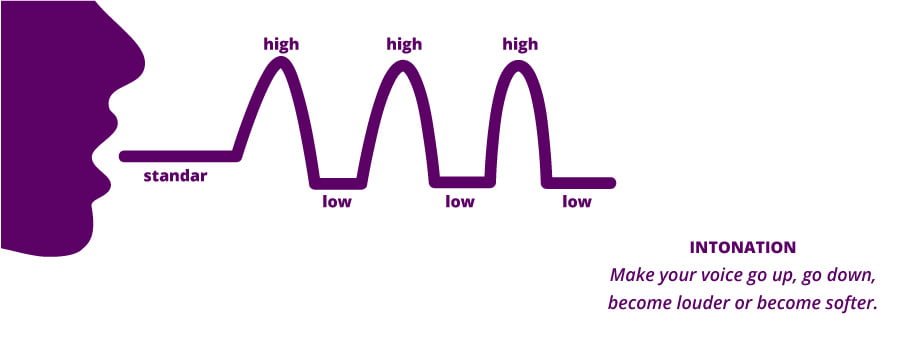
Intonation plays a major role in English pronunciation. It’s the rise and fall of your voice when you speak. This affects how words and sentences sound, which is why having good intonation is key to sounding natural when speaking English.
One of the best ways to improve your English pronunciation is to practice intonation exercises. These exercises will help you become more aware of the intonation patterns in English and will also help you adjust your pitch when speaking. Here are 12 English pronunciation exercises to get you started:
1. Listen to audio recordings and imitate the intonation.
2. Repeat sentences with different intonation patterns.
3. Try asking questions using different intonation patterns.
4. Practice saying the same phrase with rising and falling intonation.
5. Sing songs that use different intonation patterns.
6. Speak in phrases instead of single words and practice rising and falling intonation within the phrase.
7. Use exaggerated intonation when reading aloud.
8. Practice stressing certain syllables in words while maintaining the correct intonation pattern.
9. Make a list of words and practice saying them with different intonation patterns.
10. Record yourself speaking and listen back to check your intonation.
11. Read poems out loud, focusing on the intonation of the words.
12. Listen to podcasts or conversations and imitate the intonation you hear.
By practicing these exercises regularly, you will develop a better understanding of the intonation patterns in English, which will improve your overall pronunciation.
4) The schwa

English pronunciation can be a challenge for many learners of the language. One of the most difficult aspects of pronunciation is mastering the schwa sound. This sound is considered to be one of the most common in English and is used in words like butter, together and could. The schwa sound is often represented by the letter ‘e’ or ‘a’ and is typically spoken as a quick, unstressed syllable.
Learning to pronounce the schwa correctly is important for improving your overall English pronunciation. To help you with this, here are some practice exercises:
1. Listen to the word or phrase and repeat it back out loud. Focus on the schwa sound and try to make it as close to perfect as possible.
2. Use tongue twisters such as the butterfly flew through the air, the ant was angry and the cat ate a mouse. Pay special attention to the schwa sound.
3. Create sentences with words that include the schwa sound and record yourself speaking them. Listen back to your recording and try to improve your pronunciation each time.
4. Practice using words like puzzle, problem and button. Make sure to focus on pronouncing the schwa correctly when speaking these words.
By practicing these exercises regularly, you’ll start to master the schwa sound and will soon be able to use it accurately in everyday speech. Good luck!
5) Syllable stress
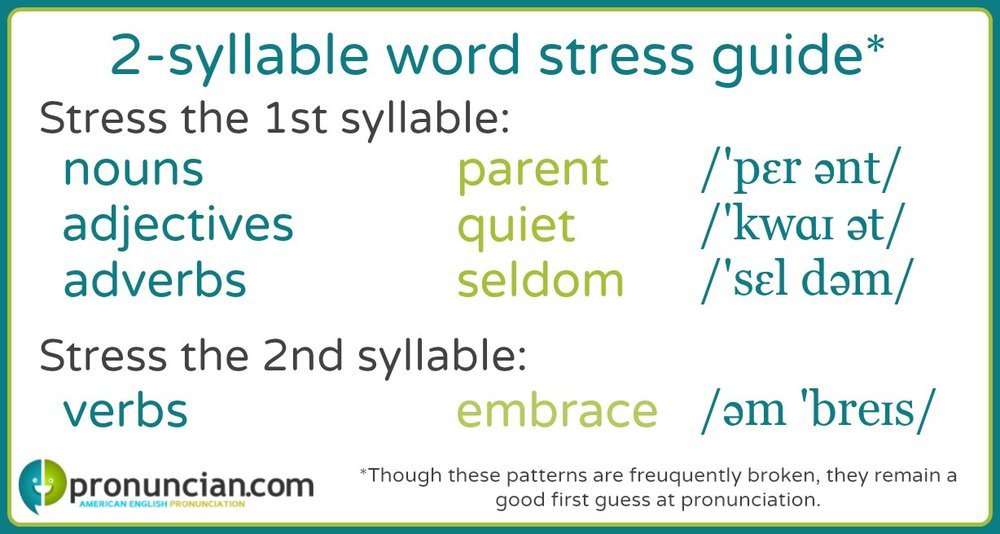
One of the most important aspects of English pronunciation is syllable stress. Knowing when to place emphasis on different syllables in a word or phrase can help you become more proficient in English pronunciation. Here are some tips for mastering syllable stress in English:
1. Focus on the content words – Content words, such as nouns, verbs, adjectives, adverbs and pronouns, are typically the words that carry the most stress in a sentence. Try to identify the content words and put an emphasis on those.
2. Listen to native speakers – Native speakers have a natural sense of which words to emphasize in a sentence. Listening to them can help you develop a better understanding of how to pronounce English correctly.
3. Practice reading aloud – Take some time each day to read aloud and focus on emphasizing the right syllables. This will help you become more aware of which syllables need extra attention and make your English pronunciation sound more natural.
By taking the time to practice these tips, you can improve your English pronunciation and become more confident when speaking English.
6) Word stress

Improving your English pronunciation is a great way to become a more confident speaker and a better communicator. One way to do this is by mastering the concept of word stress. Word stress is the emphasis placed on certain syllables in a word. It helps us to differentiate between two words that might look and sound similar. For example, if you pronounce the words conduct and conduit without stress, they sound almost identical. But when you place stress on the correct syllable, it becomes very clear which word you’re saying.
Practicing word stress is one of the best ways to improve your English pronunciation. Here are a few exercises you can use to practice English pronunciation and become a better speaker:
1. Listen to audio recordings of native English speakers and try to imitate their stress patterns.
2. Try to identify the stressed syllables in unfamiliar words and phrases.
3. Practice saying words and phrases out loud and focus on stressing the correct syllables.
4. Study and memorize commonly used word pairs that have different stresses, such as record and recount or insist and resist.
5. Break down words into syllables and practice stressing each syllable separately.
6. Repeat words and phrases in various combinations to get a feel for which syllables should be stressed.
7. Use online tools such as dictionary websites or pronunciation apps to help you learn new words and their stresses.
With enough practice, you’ll soon be able to recognize and produce English words with accurate word stress. This will help you communicate more effectively with native English speakers and make you a much more confident English speaker!
7) Consonant clusters

Improving English pronunciation is an important part of mastering the language. One of the most difficult aspects of English pronunciation is learning how to pronounce consonant clusters. Consonant clusters are when two or more consonants occur together without a vowel in between them. Examples of consonant clusters include dr, fr, pl, and sp.
When practicing English pronunciation, it is important to focus on consonant clusters to become a better speaker of English. It is also helpful to find some exercises that focus specifically on consonant clusters. Here are twelve exercises that can help you practice your English pronunciation with consonant clusters:
1. Read aloud words with consonant clusters and practice saying them slowly.
2. Create tongue twisters using consonant clusters.
3. Repeat sentences containing words with consonant clusters to practice your intonation.
4. Take a list of words with consonant clusters and make sentences out of them.
5. Practice saying consonant clusters in different positions in words (beginning, middle, and end).
6. Practice connecting the sounds of words with consonant clusters in short phrases and sentences.
7. Record yourself saying words with consonant clusters and listen back to hear how you sound.
8. Sing songs that contain words with consonant clusters to practice them in context.
9. Listen to audio recordings of conversations and try to pick out the consonant clusters.
10. Play a game where you have to repeat words with consonant clusters quickly.
11. Practice connecting consonant clusters with vowels (e.g., pl-ea-se).
12. Draw pictures for words with consonant clusters to help you remember them more easily.
By practicing these exercises, you can improve your English pronunciation and learn how to pronounce consonant clusters more confidently. Good luck!
8) Vowel reduction

When it comes to English pronunciation, vowel reduction is an important part of speaking clearly. Vowel reduction is the process of making a long vowel sound shorter and weaker in order to blend words together. This can be difficult for English language learners because the rules for how to reduce vowels vary depending on the word and its context.
To help you practice vowel reduction, here are some exercises that will help you practice correctly reducing vowels in English.
1. Listen to native English speakers speaking and pay attention to how they reduce their vowels. Try to imitate their accent as closely as you can.
2. Read out loud from a book or article and focus on blending words together by reducing vowels.
3. Practice tongue twisters and focus on pronouncing the words with reduced vowels.
4. Sing along to popular songs and try to replicate the singer’s pronunciation.
5. Record yourself speaking and compare your pronunciation to that of a native speaker.
By practicing these exercises regularly, you can gradually improve your English pronunciation and accent. With enough practice, you will be able to accurately reduce your vowels and speak with clarity and confidence!
9) R-controlled vowels

When it comes to English pronunciation, one of the more difficult sounds for non-native speakers to perfect is the R-controlled vowel. This sound is created when an r is added after a vowel, such as in the word car. To help you perfect this challenging sound, here are some tips and exercises to help you master R-controlled vowels.
First of all, focus on being aware of how your mouth moves and what your tongue is doing while you make the sound. The tip of your tongue should be tucked up against the roof of your mouth behind your teeth. At the same time, you should be pushing air through your mouth with the sides of your tongue. Try practicing by making the sound of a rolling R (rrrrr) but with your lips pursed like you’re saying the letter O.
To practice hearing and producing R-controlled vowels, try this exercise: say each word below out loud, exaggerating the R-controlled sound in each one:
Once you’ve mastered these words, try saying a few sentences or phrases that contain R-controlled vowels. Here are a few examples to get you started:
1. The car was parked by the door.
2. I hurt my finger while playing with a pearl.
3. He learned a new word early in the morning.
4. She went to get a star for her fur coat.
As you can see, mastering R-controlled vowels takes both practice and awareness of how your mouth is moving while making the sound. Keep practicing and soon you’ll be able to produce this tricky sound with ease!
10) Diphthongs
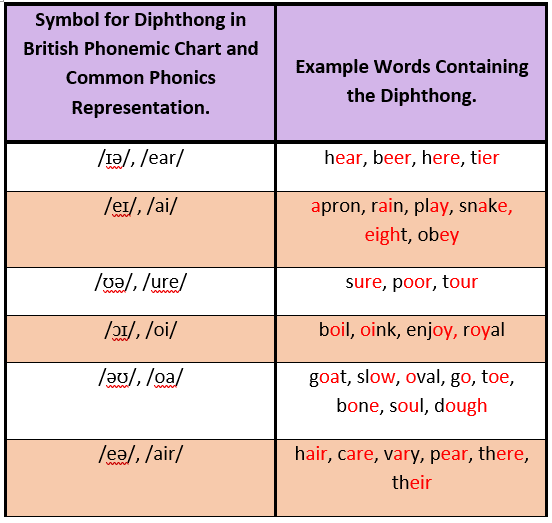
English pronunciation can be tricky for learners of the language, but it is essential for understanding and being understood. One type of pronunciation to practice is diphthongs. Diphthongs are a combination of two vowel sounds that form one syllable. In English, there are eight common diphthongs – oi, ou, oy, ow, aw, air, ear, and ire.
It’s important to practice these diphthongs with your mouth and tongue to get comfortable with the sounds. To do this, start with basic exercises like stretching out the sound while increasing and decreasing your voice intensity. You can also practice saying pairs of words that have the same diphthong sound, like toy and boy or now and low.
When you’re ready to take it up a notch, try using sentences and full conversations. If you’re able to find a native English speaker who can help you practice, that would be ideal, but don’t be afraid to practice on your own too!
Remember to go slowly at first and make sure your mouth is in the correct position for each diphthong. With enough practice, you will find yourself becoming much more confident with English pronunciation!
11) Elision

One of the most important parts of learning English pronunciation is understanding elision. Elision is the process of omitting certain sounds when two words are combined in order to form a single phrase or sentence. Understanding how to properly elide words can help make your English pronunciation smoother and more natural.
12) Assimilation
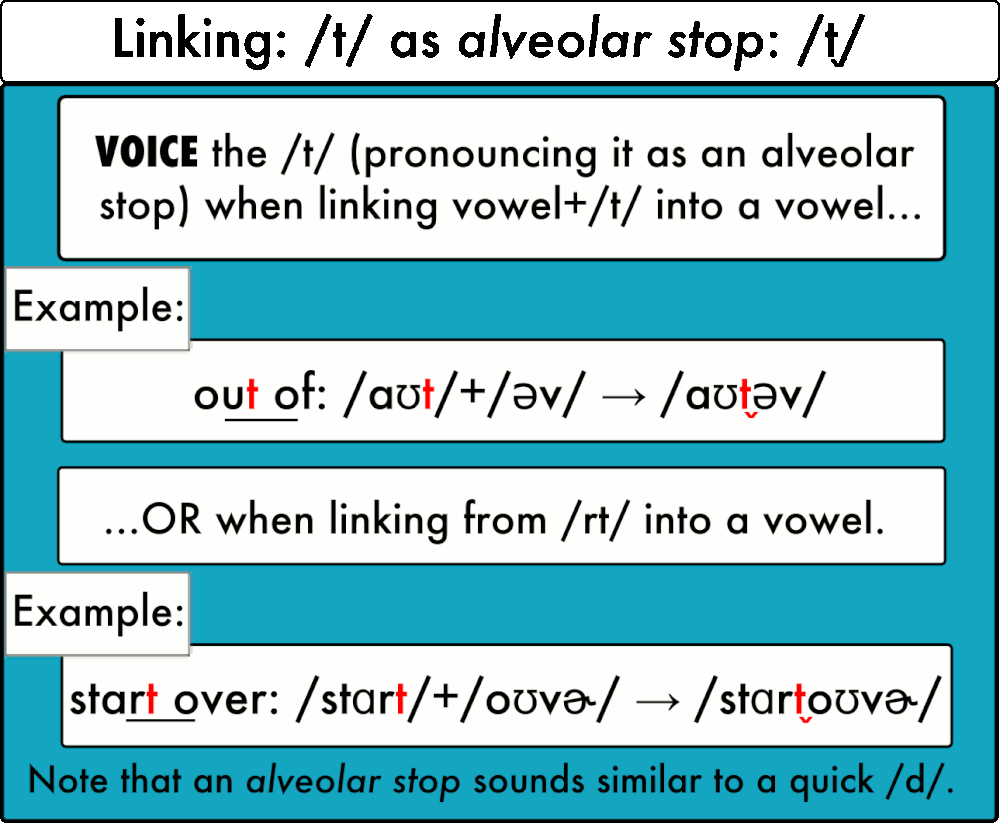
Improving your English pronunciation is key to developing a confident accent. Assimilation is a key concept in English pronunciation, which refers to the way sounds are influenced by each other. For example, when the ‘t’ sound in the word ‘stop’ is followed by the ‘s’ sound in the word ‘shop’, the ‘t’ sound is changed to an ‘sh’ sound. This is known as assimilation.
To practice assimilation, try these pronunciation exercises:
1. Speak the following sentences aloud and pay attention to the changing of the ‘t’ sound to an ‘sh’ sound:
-I stop shopping.
-The student stopped studying.
-We don’t stop talking.
2. Repeat the words ‘top’ and ‘shop’ several times, saying each word clearly with a pause between them. Then, speak them together as one word, paying close attention to how the ‘t’ sound changes to an ‘sh’ sound.
3. Repeat the words ‘tell’ and ‘shell’ several times, saying each word clearly with a pause between them. Then, speak them together as one word, paying close attention to how the ‘t’ sound changes to an ‘sh’ sound.
By practicing these English pronunciation exercises regularly, you can quickly improve your understanding and mastery of assimilation and other key concepts in English pronunciation. Good luck!

I want to improv my English
Hi Halima, Thank you for your message. Kindly head to the https://preconceptacademy.com/all-instructors/. We have a long list of very qualified instructors who are readily available to assist you. You can go through their profiles and decide on who you’d prefer to assist you on this exciting journey. On your left (PC)/top (mobile) is the booking panel, simply choose which course you’d like to book, then click on the employees section to see a drop down menu of all instructors that teach that specific course and their charge per hour. If you need any further assistance, kindly contact us via info@preconceptacademy.com. We look forward to helping you to achieve this goal.
I’m interesting to learn English with you
Hi Jonathan, Thank you for your interest. We would be more than happy to help you achieve your English learning goals. Our qualified instructors are readily available to assist you every step of the way. We have a variety of ESL courses namely: Business English, Conversational English, Vocabulary, Grammar and Writing, IELTS, TOEFL. Which of these courses would you be interested in learning?
Morning
How are doing Mussa